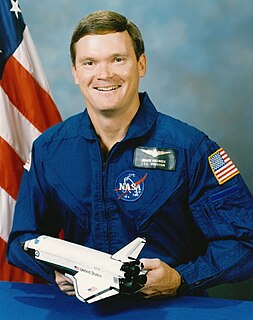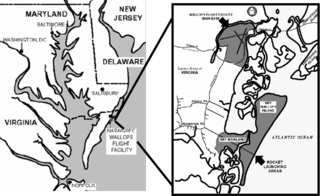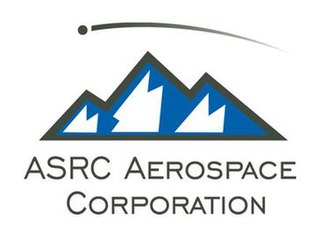Related Research Articles

David McDowell Brown was a United States Navy captain and a NASA astronaut. He died on his first spaceflight, when the Space Shuttle Columbia (STS-107) disintegrated during orbital reentry into the Earth's atmosphere. Brown became an astronaut in 1996 but had not served on a space mission before the Columbia disaster. Brown was posthumously awarded the Congressional Space Medal of Honor.
The space-grant colleges are educational institutions in the United States that comprise a network of fifty-two consortia formed for the purpose of outer space-related research. Each consortium is based in one of the fifty states, the District of Columbia, or Puerto Rico, and each consists of multiple independent space-grant institutions, with one of the institutions acting as lead.

Naoko Yamazaki is a Japanese engineer and former astronaut at JAXA. She was the second Japanese woman to fly in space. The first was Chiaki Mukai.
The Centennial Challenges are NASA space competition inducement prize contests for non-government-funded technological achievements by American teams.

Bruce Edward Melnick is a retired American astronaut and United States Coast Guard officer. Following retirement from NASA and the Coast Guard, he entered the aerospace industry. He served as a vice president with the Boeing Co.'s Integrated Defense Systems group, in charge of Boeing's Florida operations at the John F. Kennedy Space Center (KSC). Melnick retired in 2008 and currently resides on Merritt Island, Florida.

The Florida Institute of Technology is a private research university in Melbourne, Florida. The university comprises four academic colleges: Engineering & Science, Aeronautics, Psychology & Liberal Arts, and Business. Approximately half of FIT's students are enrolled in the College of Engineering & Science. The university's 130-acre primary residential campus is near the Melbourne Orlando International Airport and the Florida Tech Research Park.

Wallops Flight Facility (WFF) is a rocket launch site on Wallops Island on the Eastern Shore of Virginia, United States, just east of the Delmarva Peninsula and approximately 100 miles (160 km) north-northeast of Norfolk. The facility is operated by the Goddard Space Flight Center in Greenbelt, Maryland, and primarily serves to support science and exploration missions for NASA and other Federal agencies. WFF includes an extensively instrumented range to support launches of more than a dozen types of sounding rockets; small expendable suborbital and orbital rockets; high-altitude balloon flights carrying scientific instruments for atmospheric and astronomical research; and, using its Research Airport, flight tests of aeronautical research aircraft, including unmanned aerial vehicles.

The University of Alabama in Huntsville (UAH) is a public research university in Huntsville, Alabama. The university is accredited by the Southern Association of Colleges and Schools and comprises nine colleges: arts, humanities & social sciences; business; education; engineering; honors; nursing; professional & continuing studies; science; and graduate. The university's enrollment is approximately 10,000. It is part of the University of Alabama System and is classified among "R1: Doctoral Universities: Very High Research Activity".

The Pacific Spaceport Complex – Alaska (PSCA), formerly known as the Kodiak Launch Complex (KLC), is a dual-use commercial and military spaceport for sub-orbital and orbital launch vehicles. The facility is owned and operated by the Alaska Aerospace Corporation, a public corporation of the State of Alaska, and is located on Kodiak Island in Alaska.

The California Space Authority (CSA) was a nonprofit corporation representing the commercial, civil, and national defense/homeland security interests of California's diverse space enterprise community in four domains: Industry, Government, Academia, and Workforce. CSA was also a participating member in the Coalition for Space Exploration. It officially ceased operations on June 10, 2011.
UP Aerospace, Inc. is a private spaceflight corporation headquartered in Denver, Colorado. UP Aerospace provides sub-orbital transportation for corporate, military and educational payloads, via their SpaceLoft XL sounding rocket launch vehicles.

Spaceport America, formerly the Southwest Regional Spaceport, is an FAA-licensed spaceport located on 18,000 acres (7,300 ha) of State Trust Land in the Jornada del Muerto desert basin 45 miles (72 km) north of Las Cruces, New Mexico, and 20 miles (32 km) southeast of Truth or Consequences. With Virgin Galactic's launch of the VSS Unity, with three people aboard, on May 22, 2021, New Mexico became the third US state to launch humans into space after California and Florida.

Irene Duhart Long was an American physician and was an official at the U.S. National Aeronautics and Space Administration. She was the first female chief medical officer at the Kennedy Space Center.

ASRC Aerospace Corporation is a subsidiary of Arctic Slope Regional Corporation (ASRC). ASRC Aerospace is an enterprise formed in November 1997. Headquartered in Greenbelt, Maryland, ASRC Aerospace supports 15 major contracts providing a base of over 1000+ personnel. The company's segments are multiple operating units engaging primarily in U.S. Government contracts.

Space Florida is the aerospace economic development agency of the State of Florida. The agency was created by consolidating three existing state space entities into a single new organization via the Space Florida Act, enacted in May 2006 by the Florida Legislature. The predecessor entities were the Florida Space Authority, Florida Space Research Institute and Florida Aerospace Finance Corporation.

The Commercial Spaceflight Federation is a private spaceflight industry group, incorporated as an industry association for the purposes of establishing ever higher levels of safety for the commercial human spaceflight industry, sharing best practices and expertise, and promoting the growth of the industry worldwide. Issues that the Commercial Spaceflight Federation work on include, but are not limited to, airspace issues, FAA regulations and permits, industry safety standards, public outreach, and public advocacy for the commercial space sector.
NASA Alumni League is a U.S. organization that supports people that have worked for or at NASA or its predecessor NACA, to stay connected, and to "support the nation's space programs with technical expertise, educational outreach, and financial contributions to STEM organizations." The organization operates across the nation, also with state chapters that allow patrons to network locally. Three goals of NAL in the early 21st century were to "communicate with the NASA community", "to aid the NASA community with its comprehension of engineering and science, and "encourage members to participate in community service and in turn, encourage a dedication to the pursuit of scientific knowledge that benefits all humankind. " NAL is not part of NASA or the U.S. government, it is a non-profit organization founded in 1986.

SpaceTEC® is one of the Advanced Technological Education (ATE) Centers funded by the National Science Foundation (NSF) for developing partnerships between academic institutions and industry partners to promote improvement in the education of science and engineering technicians at the undergraduate and secondary school levels. With an emphasis on two-year colleges, the ATE program focuses on the education of technicians for the high-technology fields that drive the world's economies. Located in Cape Canaveral, Florida, SpaceTEC® supports the education and credentialing of aerospace technicians in six core areas and three advanced disciplines: (1) space vehicle processing activities (2) aerospace manufacturing; and (3) composite materials. A national consortium of community and technical colleges, universities, business and industry organizations, and government agencies promotes careers and educates candidates for technical employment.
The University of Maryland, Baltimore County (UMBC) features a variety of research centers and institutes both based on the campus and affiliated with other academic institutions. These centers and institutes listed below seek out to expand their research, educate, and promote partnerships between the university and the Baltimore-Washington Metropolitan Area and beyond.

Spaceport Camden is a licensed spaceport in Camden County, Georgia, near the city of Woodbine. The site tested the largest solid rocket motor ever fired as part of the Apollo Program and Camden County, Georgia was originally considered as a NASA launch site in the 1960s. Spaceport Camden began limited development as a rocket launch facility in early 2014, with its first launch taking place in August 2017, reaching 5,000 ft (1,524 m).
References
- ↑ "Florida Space Research Institute Signs Technology Contract with NASA" (Press release). SpaceRef.com. March 8, 2001. Retrieved February 5, 2010.
- ↑ "NASA Spaceport Student Competition - Florida Space Grant Consortium". Archived from the original on July 13, 2009. Retrieved February 5, 2010.
- ↑ "Florida Aviation Code Section 331.302 - Aviation And Aerospace Facilities And Commerce - Space Florida; creation; purpose. - Florida Attorney Resources - Florida Laws". Archived from the original on October 11, 2008. Retrieved February 5, 2010.
- ↑ "History of Space Florida". Space Florida. Archived from the original on 2009-01-05.